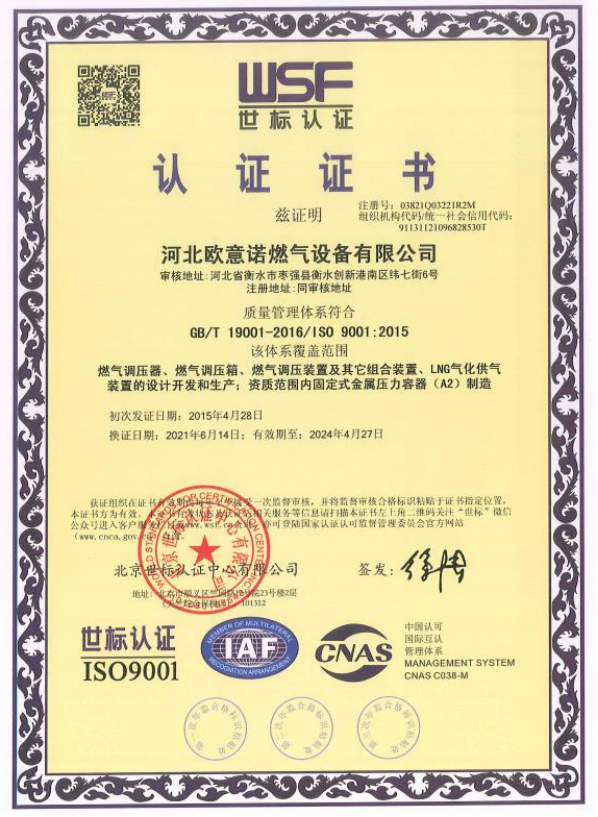
Nov . 21, 2024 21:26
Back to list
shut-off valve
Understanding the Shut-off Valve Functionality and Applications
The shut-off valve is an essential component in various fluid and gas systems, playing a critical role in managing flow and maintaining safety across numerous industries. Whether in residential plumbing, industrial processes, or commercial settings, the shut-off valve's primary purpose is to halt the flow of fluid or gas, ensuring control over the system and preventing unwanted leakage or accidents.
Definition and Types of Shut-off Valves
A shut-off valve is a device that stops or allows the flow of fluids or gases through a piping system. It can be operated manually or automatically, depending on the application and the design of the system. The most common types of shut-off valves include
1. Gate Valves Used mainly for on/off services; they provide minimal flow resistance when fully open but are not suitable for throttling applications.
2. Ball Valves These valves have a spherical disc (the ball) that controls flow. When the valve is open, the hole in the ball aligns with the flow direction, providing low resistance and quick operation.
3. Globe Valves Designed for regulating flow in a pipeline, globe valves provide greater throttling capability compared to gate or ball valves.
4. Butterfly Valves Featuring a rotating disc, butterfly valves allow for quick shut-off and are often used in larger pipelines.
5. Check Valves While not a shutdown mechanism, check valves ensure that fluid flows in only one direction, preventing backflow and system contamination.
Key Functions of Shut-off Valves
Shut-off valves perform several crucial functions
- Flow Control They can selectively allow or restrict fluid or gas flow, making them essential for managing operational processes in various systems.
- Isolation Shut-off valves isolate sections of a system for maintenance or emergency situations. This feature is particularly important in industrial settings where workers need to perform repairs safely.
- Pressure Management Certain shut-off valves are designed to withstand high pressures, preventing leaks and maintaining system integrity under various operating conditions
.shut-off valve

- Safety In many applications, shut-off valves are integral to safety systems, ensuring that dangerous fluids or gases can be contained quickly if there is a fault in the system.
Applications of Shut-off Valves
Shut-off valves are ubiquitous in numerous fields. Here are a few key applications
- Residential Plumbing Homeowners often rely on shut-off valves to cut off the water supply in areas like sinks, toilets, and washing machines. This allows for easy repairs without needing to drain the entire system.
- Industrial Processes In manufacturing and processing plants, shut-off valves are vital for controlling the flow of raw materials, such as water, chemicals, or gas, ensuring the safety and efficiency of operations.
- HVAC Systems In heating, ventilation, and air conditioning systems, shut-off valves regulate the flow of refrigerants and other fluids, contributing to energy efficiency and operational reliability.
- Oil and Gas Industry Shut-off valves are crucial for preventing spills and leaks in pipelines transporting oil and gas. They help maintain environmental safety and compliance with regulations.
Maintenance and Considerations
Regular maintenance of shut-off valves is essential to ensure their reliable operation. Factors to consider include
- Inspection Regularly inspect valves for leaks and corrosion, particularly in harsh environments or underground applications.
- Exercise Periodically open and close valves to prevent them from becoming stuck due to inactivity, especially in systems that may not be in constant use.
- Replacement Older valves may need replacing to maintain system integrity. Utilizing modern materials and designs can enhance performance and reliability.
Conclusion
Shut-off valves play an indispensable role in managing flow, ensuring safety, and maintaining the efficiency of various systems. Understanding the different types, functions, and applications of shut-off valves can help professionals and homeowners alike to make informed decisions about their usage and maintenance. As technology advances, the development of more reliable and efficient shut-off valves will undoubtedly continue, further enhancing safety and efficiency across numerous sectors.
Next:
Latest news
-
Safety Valve Spring-Loaded Design Overpressure ProtectionNewsJul.25,2025
-
Precision Voltage Regulator AC5 Accuracy Grade PerformanceNewsJul.25,2025
-
Natural Gas Pressure Regulating Skid Industrial Pipeline ApplicationsNewsJul.25,2025
-
Natural Gas Filter Stainless Steel Mesh Element DesignNewsJul.25,2025
-
Gas Pressure Regulator Valve Direct-Acting Spring-Loaded DesignNewsJul.25,2025
-
Decompression Equipment Multi-Stage Heat Exchange System DesignNewsJul.25,2025

